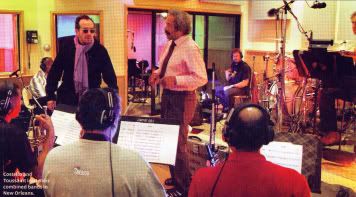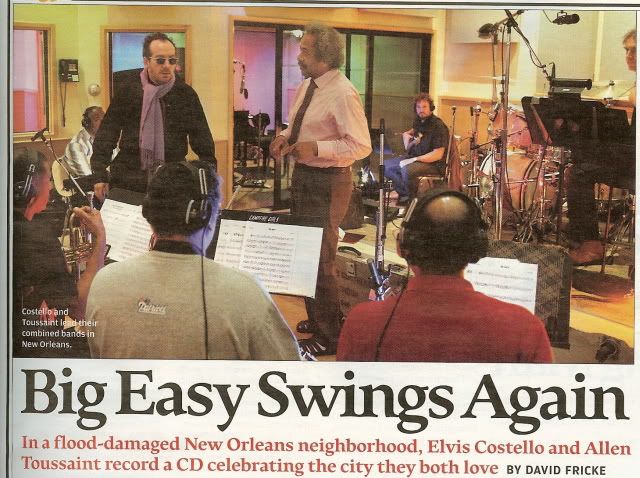Scanned from print edition -

Rolling Stone , Feb.9 2006
Big Easy Swings Again
In a flood-damaged New Orleans neighborhood,
Elvis Costello and
Allen Toussaint record a CD celebrating the city they both love
BY DAVID FRICKE
NEW ORLEANS PIANIST, songwriter and producer Allen Toussaint stands at a microphone, waiting for his cue, in the vocal booth at Piety Street Recording, a studio in the city’s Bywater section, near the Mississippi River. Toussaint ,68, is the picture of immaculate Southern comfort in a gray suit jacket, brown slacks, cream white shirt, perfectly knotted caramel brown tie and open. toed sandals. But there is no missing the gently surging indignity in Toussaint’s voice as the tape rolls and the funk kicks in:
“What happened to the Liberty Bell/I heard so much about/Did it really ding dong/It must have dinged wrong/It didn’t ding long.”
Five months after Hurricane Katrina ripped through Toussaint’s hometown, much of it is still in ruins,a victim of collapsed levees and chaotic relief efforts. Hurt and fear are in every silken note he sings.
Elvis Costello listens in the adjacent control room, shaking his head in awe. Toussaint is putting vocal overdubs on
“Who’s Gonna Help Brother Get Further,” a rhythmic plea for a helping he originally wrote and produced in 1970 for Lee Dorsey. The song is also one of seventeen that Toussaint and Costello, 51, have recorded together for The River in Reverse, to be released in May on Verve Records. Like everything else the duo has written and cut for the album — new songs like the title track,
“Broken Promiseland” and
“Ascension Day”; poignant covers of vintage Toussaint gems such as
“Freedom for the Stallion” and
“On Your Way Down” — “Brother” reverberates with the power of emotional eyewitness, born of the devastation just outside the studio’s front door.
Sitting with Costello during a session break, Toussaint politely insists that this “is not a sympathy record. These songs can live in war and peace, anytime, anywhere. This recording is far more important, and bigger, than Katrina.”
Costello agrees. “This was a chance to make something positive out of something dispiriting,” he says of the album, produced by
Joe Henry and featuring Costello’s group the
Imposters with local musicians from Toussaint’s band. “It’s also forward-looking. It is representative of the culture here. And Allen is one of the most important people in that culture.”
Costello and Toussaint’s sessions at Piety in early December (following a week’s work in Los Angeles) are one of the heartening signs of life in this otherwise ravaged city. The Lower Ninth Ward, a short drive from the studio, on the other side of the Industrial Canal, is a wasteland; rushing water from breached levees pushed houses off their pilings, flattening them. Bywater itself was severely damaged by wind and water; Toussaint’s own home in Gentilly was flooded, destroying a lifetime’s worth of personal archives.
“I was feeling bad one day,” Henry says, “because I was keeping Allen’s horn players around, waiting for a take. I said, ‘Do you want to go out and come back later?’ They said, "We don’t want to go out there. We know what it looks like.”
Toussaint evacuated the city after the storm, basing himself in New York, where he and Costello -- with whom he had collaborated on Costello’s 1989 album Spike — ran into each other at Katrina benefit gigs, often doing Toussaint’s songs together. “It used to be common to see ‘songbook’ records,” Costello says, “before rock & roll singers wrote their own songs. I thought, ‘Maybe it’s time for an Allen Toussaint songbook album. Maybe we could do it
together.’”
Toussaint not only said yes, he co-wrote five songs with Costello. “To be invited out of an enforced semiretirement,” Toussaint notes with a sly smile, “was a wonderful opportunity.” And Costello “was tireless. As we wrote, he gave vocal performances of the kind that you would give in the studio.”
The two work together with the easygoing warmth of mutual fans and old friends. On their first day of recording in LA., they got master takes of
“Greatest Love” and
“Nearer to You” in fifteen minutes. But at Piety, it is fascinating to watch Toussaint’s attention to detail, an instinct for soulful perfection that ran through the Sixties and Seventies hits he wrote and produced for, among others, Irma Thomas, Ernie K-Doe and the Meters.
“It’s the closest thing in my life to being around a Duke Ellington,” says Henry, who produced Toussaint’s contributions to the recent I Believe to My Soul and Our New Orleans collections. “After a take, he’ll say to his horn section, ‘That was right, but that’s all it is. Now it has to be
alive.”
There is no better word to describe the music Costello and Toussaint have made, especially during their week in this city coming back from near-death. On the night they finish “Who’s Gonna Help Brother Get Further,” they also turn to the dark Costello ballad “The River in Reverse.” Costello wrote it within weeks of the flooding. His love for New Orleans and his rage at its betrayal are explicit in his lyrics and vocal:
“There must be something better than this/I don’t see how it can get much worse/What do we have to do to send/The river in reverse?’
It is hard working, Costello admits, amid so much loss: “You think it’s a bit frivolous.” But the healing is obvious as Toussaint listens to the urgency in Costello’s song and smiles.
For now Toussaint has little but this record to call his own, and he’s grateful for it. “At the moment, I have no past and no future,” he says. “I wake up in the morning to do this. This is all that I am.”


